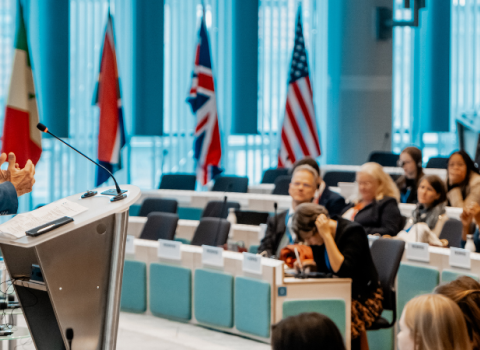Countries accounting for 75% of global GDP aim for carbon neutrality by 2060, creating huge demand for clean technologies. Horizon Europe must support research and scale-up to ensure Europe can lead these markets

Johanna Lehne, senior policy advisor for E3G, and Eleonora Moro, researcher at E3G.
The EU has upped its climate change target and is now aiming to reduce emissions by at least 55% by 2030. A high bar has been set and 2021 is the year in which we’ll start to see how - and whether – this objective can be achieved.
Climate research funding by the new EU research programme, Horizon Europe, will play a central role in ensuring clean technologies are deployed at scale, and to develop innovative business models, financing schemes and the governance framework needed to monitor progress.
Next week, hundreds of the most significant players in EU research policy are convening at the Science|Business network conference. Policymakers from the European Commission include vice president Margrethe Vestager, Mariya Gabriel, the research commissioner and health commissioner Stella Kyriakides.
Also taking part will be German MEP Christian Ehler, co-rapporteur on the 2021 - 2027 Horizon Europe research programme, together with officials from DG research, representatives from EU member states, academia, civil society and the private sector.
With Horizon Europe recently launched and member states currently drafting massive EU-backed recovery plans, this represents a huge opportunity to send a strong, clear market signal that could boost climate- and energy-related research and innovation, especially in sectors which have been slower to reduce carbon emissions, such as steel, cement making, transport and industry.
This will not be a moment too soon. Horizon Europe is getting off the ground at a time when publicly-funded clean research and development in EU member states is being cutback. Between 2010 and 2018 spending decreased, and the EU currently invests less in climate-related R&D than the US, Japan, China and South Korea.
The fallout is predictable: according to an October report by the European Commission, patenting activity in clean energy technology in the EU peaked in 2012, and has been declining ever since.
Despite this, the EU remains a global leader in patents of high-value clean energy technologies. Clean tech remains Europe’s race to lose. And the market is growing: while the aim of reducing emission by 55% by 2030 is one of the best, the EU is no longer alone among major global economies in setting ambitious climate targets.
In the past six months China has committed to carbon-neutrality by 2060, Joe Biden has taken up the US presidency promising a step-change in US climate ambitions and many other countries have announced their own targets.
Overall, the countries that have announced a climate or carbon neutrality target by 2030-2060 account for 75% of global GDP. This underlines how rapidly the market for clean technologies is growing.
That positions Europe well in terms of green technologies in which it has a lead, and also justifies investment in attempts to replicate some of these successes. For example, the European Battery Alliance, launched by the European Commission in 2017, brings together 400 companies and other stakeholders from across the value chain, to identify how Europe can gain market share in a rapidly growing industry.
Europe is also a clear leader in offshore wind technology and major markets outside Europe may soon be calling on European companies, technologies and workers to help them accelerate their own green transitions.
All of which begs the question of what exactly the EU should do in the coming months to ensure Horizon Europe’s opening year meets this moment. Here are three ideas:
1. Horizon Europe must have a solid climate tracking mechanism in place, to ensure its 35% climate innovation funding target is met. Ahead of the programme’s first calls for proposals, the Commission should ensure a publicly accessible tracking mechanism, in line with European Court of Auditors recommendations.
2. Invest in more climate research projects in eastern and southern Europe, to create jobs, increase competitiveness, diversify economies and increase the resilience of a workforce traditionally dependent on fossil fuels. This should include integrating eastern and southern European countries in EU-wide value chains, supporting cross-border projects and innovative cities and regions, and increasing attractiveness of research careers. Mobilising all EU member states in this way will increase EU competitiveness, improve cohesion and contribute to the EU becoming a stronger global player.
3. Innovation priorities should be guided by an independent, science-based centre of technical expertise, such as the European climate change council proposed under the European climate law. Such a body could also promote ‘learning by doing’ and monitor progress, to rapidly advance critical clean technologies, while also reducing dependence on high-risk alternatives, and maintaining the latest knowledge on technological and social developments.
Eleonora Moro is a researcher at E3G, an independent European climate change think tank, focusing on research, innovation and energy systems.
Johanna Lehne is a senior policy advisor for E3G, specializing in industrial decarbonisation and competition policy.





 A unique international forum for public research organisations and companies to connect their external engagement with strategic interests around their R&D system.
A unique international forum for public research organisations and companies to connect their external engagement with strategic interests around their R&D system.